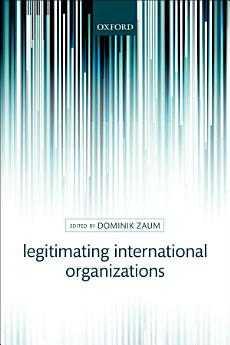Legitimating International Organizations
Dominik Zaum
2013 ira. · OUP Oxford
Liburu elektronikoa
272
orri
family_home
Egokia
info
reportBalorazioak eta iritziak ez daude egiaztatuta Lortu informazio gehiago
Liburu elektroniko honi buruz
The legitimacy of international and regional organizations and their actions is frequently asserted and challenged by states and commentators alike. Their authorisations or conduct of military interventions, their structures of decision-making, and their involvement into what states deem to be domestic matters have all raised questions of legitimacy. As international organizations lack the coercive powers of states, legitimacy is also considered central to their ability to attain compliance with their decisions. Despite the prominence of legitimacy talk around international organizations, little attention has been paid to the practices and processes through which such organizations and their member states justify the authority these organizations exercise - how they legitimise themselves both vis-à-vis their own members and external audiences. This book addresses this gap by comparing and evaluating the legitimation practices of a range of international and regional organizations. It examines the practices through which such organizations justify and communicate their legitimacy claims, and how these practices differ between organizations. In exploring the specific legitimation practices of international organizations, this book analyses the extent to which such practices are shaped by the structure of the different organizations, by the distinct normative environments within which they operate, and by the character of the audiences of their legitimacy claims. It also considers the implications of this analysis for global and regional governance.
Egileari buruz
Dominik Zaum is Reader in International Relations at the University of Reading, and a Senior Research Fellow in Conflict and Fragility at the UK's Department for International Development (DFID). His research focuses on the politics of international organisations, especially the UN, and on the political economy of international peace- and statebuilding efforts. His publications include The Sovereignty Paradox: The Norms and Politics of International Statebuilding (OUP, 2007), The United Nations Security Council and War: The Evolution of Thought and Practice Since 1945 (OUP, 2008), and Political Economy of Statebuilding: Power after Peace (Routledge, 2012).
Baloratu liburu elektroniko hau
Eman iezaguzu iritzia.
Irakurtzeko informazioa
Telefono adimendunak eta tabletak
Instalatu Android eta iPad/iPhone gailuetarako Google Play Liburuak aplikazioa. Zure kontuarekin automatikoki sinkronizatzen da, eta konexioarekin nahiz gabe irakurri ahal izango dituzu liburuak, edonon zaudela ere.
Ordenagailu eramangarriak eta mahaigainekoak
Google Play-n erositako audio-liburuak entzuteko aukera ematen du ordenagailuko web-arakatzailearen bidez.
Irakurgailu elektronikoak eta bestelako gailuak
Tinta elektronikoa duten gailuetan (adibidez, Kobo-ko irakurgailu elektronikoak) liburuak irakurtzeko, fitxategi bat deskargatu beharko duzu, eta hura gailura transferitu. Jarraitu laguntza-zentroko argibide xehatuei fitxategiak irakurgailu elektroniko bateragarrietara transferitzeko.




